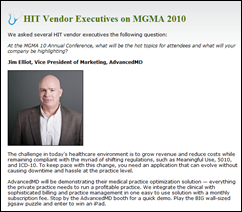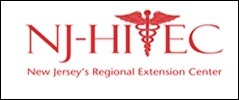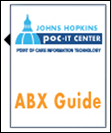The article about Pediatric Associates in CA has a nugget with a potentially outsized impact: the implication that VFC vaccines…
News 10/21/10
A reader forwarded findings from a recent Ovum report entitled Selecting an Ambulatory EHR Vendor in the Healthcare Market. The three vendors on Ovum’s short list were eClinicalWorks, GE Healthcare, and Cerner. Ovum argues that these vendors have established strong brand names in the ambulatory market and have demonstrated market-leading positions. I would definitely agree that eCW is a leader in the ambulatory market. GE was at one time. And, I’ve never thought of Cerner as a leader in this space, especially when you exclude hospital-owned practices. Ovum goes on to say that Cerner is the most versatile and multi-faceted of all the vendors they reviewed (which included the likes of Allscripts, NextGen, Sage, athenahealth, and Amazing Charts). Anyone besides me surprised? I have to admit I’ve never seen the Cerner ambulatory EHR, so I’ll take a peek at it at MGMA and report back.
Speaking of MGMA, take a moment to peruse our latest Vendor Exec question where we asked several industry leaders what the hot topics will be for attendees and what their company will be highlighting.
The 250-provider Greater Florida Anesthesiologists chooses McKesson’s Revenue Management Solutions for its medical billing and PM operations.
MGMA has signed deals with a couple of vendors on behalf of its members. It partners with MedAssets for group purchasing services. MGMA also selects Outcome Sciences to provide PQRI registry reporting at preferred rates.
The New Jersey HIT Extension Center picks ITelagen to provide technical assistance for physicians implementing EHRs and working to earn Meaningful Use funds. In checking the NJ-HITEC Website, I didn’t see mention of any other selected vendors (technical or EHR), but perhaps additional announcements are imminent.
Meanwhile, the Colorado REC says it has signed up its 800th provider, signifying it is more than one-third of its way to achieving its goal of 2,295 primary care providers. CO-REC reached the milestone in a mere three months. Great sales effort, but of course CO-REC now faces the more challenging task of helping these providers implement EHRs and qualify for Meaningful Use reimbursements.
Deloite releases its 2010 Technology Fast 500 rankings, which scores companies based on percentage fiscal year revenue growth from 2005 to 2009. I noticed a few HIT companies, including Medical Present Value (276), Navicure (289), Nuance (297), MEDSEEK (343), SRSsoft (362), and GetWell Networks (386).
Rebound Orthopedics (WA) and Kansas Joint and Spine Institute deploy services from Ancillary Care Solutions to improve clinical workflows and financial returns and assess compliance.
Aprima Medical Software announces new Financial Services offerings that include payment deferral programs, zero down payments, hardware integration, and flexible payment terms. Aprima president Michael Nissenbaum says the service should help doctors affected by tight credit markets.
OB/GYN Women Specialists of Georgia contracts with Waiting Room Solutions for its Web-based EHR/PM solution.
An HHS privacy and security panel recommends that physicians provide patients a short, easy to understand summary of the practice’s privacy practices, including how patient information may be used. Physicians should also discuss face-to-face with patients the way information may be exchanged with third parties, such as HIEs or an integrated delivery network. Great recommendations, but I don’t see too many physicians taking the time for the latter.
Computers trump dermatologists when it comes to finding small, pigmented melanomas, based on the results of a vendor-sponsored trial. The study found that an automated, computerized imaging and diagnostic system spotted melanomas 98% of the time, compared to 78% of the time for dermatologists.
Skyscape introduces a mobile version of the Johns Hopkins POC-IT Diabetes guide for healthcare providers.
Seventeen percent of cell phone users have looked up health or medical information on their phones and 9% have software apps on their phone to manage their health. I thought there were more of us.





